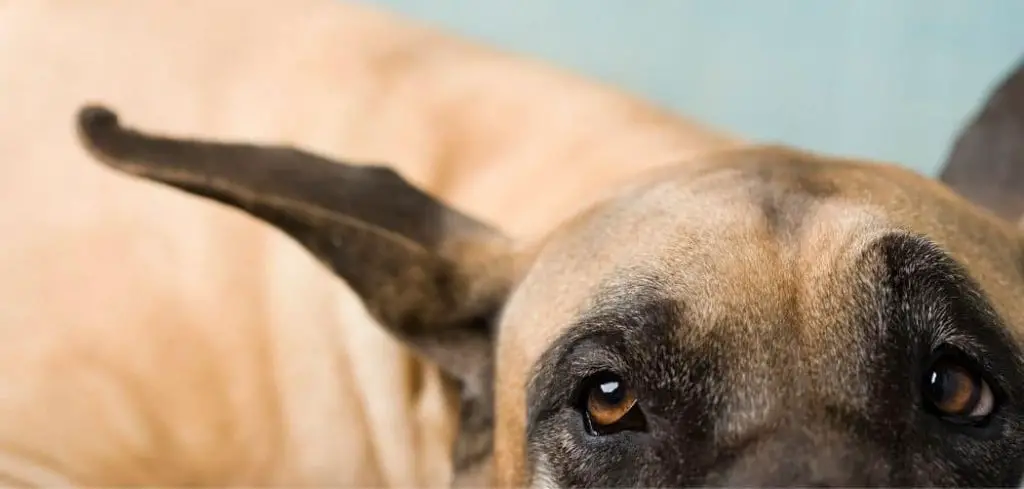When a dog has mucus in its stool during a heat cycle, it can be worrying for owners.
The combination of digestive upset and hormonal changes can leave many wondering if something is wrong or if it is a normal part of the reproductive cycle.
We outline the common causes of mucus in a dog’s poop during a heat cycle, what you can do at home, and when to seek veterinary help.
Table of Contents
Mucus in Dog Poop Heat Cycle — Why It Happens
Mucus in dog poop during a heat cycle can happen for several reasons. Hormonal shifts in estrus may affect digestion, while stress or dietary changes during this period can irritate the gastrointestinal tract. In some cases, an underlying health condition such as colitis, intestinal parasites, or infection may coincide with the dog’s heat cycle, making mucus in stool more noticeable.
Other times, the hormonal changes may worsen pre-existing sensitivities in the gut, leading to mucus production.

Mucus in Dog Poop During Heat Cycle: Common Causes
Hormonal Changes in Estrus
When a female dog is in heat, her body undergoes significant hormonal fluctuations. These hormones not only prepare her reproductive system but can also influence digestion.
Some dogs experience loose stools or excess mucus during this time due to changes in intestinal motility.
Owners may also notice behavioral changes such as restlessness or appetite shifts, making the digestive symptoms more pronounced.
Read more: Mucus in Old Dog Poop (What it could mean for senior dogs)
Stress During Heat Cycle
The stress of being in heat, especially if the dog is around other dogs or is experiencing heightened hormonal drives, can impact the gastrointestinal system.
Stress is a well-known trigger for colitis, which often presents as mucus in stool. Dogs under stress may also eat less or scavenge unusual items, both of which can upset digestion and contribute to abnormal stools.
Colitis
Colitis is a common reason for mucus in a dog’s stool. It refers to inflammation of the colon, which can be triggered by dietary indiscretion, infections, or stress.
In dogs that are in heat, colitis may become more apparent because hormonal changes increase sensitivity in the gut.
Signs may include frequent small bowel movements, straining, and the presence of blood or mucus.
Intestinal Parasites
Parasites such as whipworms, giardia, or roundworms can cause mucus in dog stool at any time, including during a heat cycle.
Because the reproductive cycle is already a stressful period, an existing parasitic infection may flare up or show more visible symptoms. Alongside mucus, owners may notice diarrhea, weight loss, or abdominal discomfort.
Infections
Bacterial or viral infections affecting the gastrointestinal tract can also lead to mucus in stools.
Dogs in heat may have a temporarily weakened immune response, making them more vulnerable to picking up an infection.
Infections may also cause lethargy, fever, or vomiting, in addition to changes in stool consistency.
Dietary Sensitivities or Changes
Sometimes, mucus in a dog’s stool during her heat cycle is unrelated to reproduction and instead tied to what she has eaten. Dogs may become pickier or hungrier during estrus, leading to sudden dietary shifts.
Eating table scraps, rich treats, or unfamiliar foods can irritate the colon and result in mucus production.
What to Do If Your Dog Has Mucus in Their Poop During Heat Cycle
If a dog shows mild mucus in stool while in heat but is otherwise acting normal, supportive care at home may be helpful.
Offering a bland diet such as boiled chicken and rice for a day or two can soothe the gut. Keeping her environment calm and minimizing stress from other pets can also help prevent colitis flare-ups.
Ensure she has access to clean water, since dehydration can worsen digestive issues. Avoid giving too many rich treats or sudden changes in diet during her heat cycle.
If she is prone to gastrointestinal issues, a high-quality, easily digestible food may keep stools firmer. Probiotics may also support gut health during times of stress or hormonal shifts.
When to Call or Visit Your Vet
While mild mucus in dog stool during a heat cycle can sometimes be temporary, there are times when veterinary care is essential.
If the mucus persists for several days or is accompanied by blood, diarrhea, or straining, a vet visit is recommended.
Signs such as vomiting, loss of appetite, lethargy, or abdominal pain should also be taken seriously.
Parasites, infections, or more serious gastrointestinal conditions require prompt treatment to avoid complications.
Additionally, if an older unspayed dog shows recurring issues with mucus in stool, it may be a sign of an underlying reproductive health problem that needs further evaluation.
Read more: Mucus in Runny Dog Poop (When it’s more than just upset stomach)
Key Takeaway
Mucus in dog poop during a heat cycle can result from hormonal changes, stress, dietary issues, or underlying health conditions.
While some cases may resolve with simple at-home care, persistent or severe symptoms should be evaluated by a veterinarian.
By monitoring your dog closely and supporting her digestive health during estrus, you can help keep her comfortable and safe.
